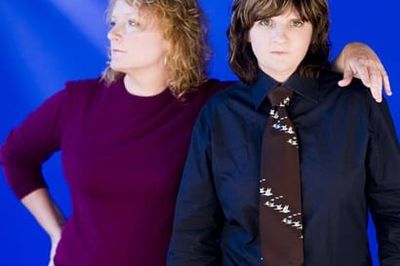The Indigo Girls might as well be a superhero duo: Singers, songwriters and activists — by day and by night. Emily Saliers chatted exclusively with us about labels, influences and confronting the big issues through activism.
How do you identify yourself? You’re a singer, songwriter, activist for gay rights and other issues…
Emily Saliers: I guess there’s not one way to identify ourselves that encompasses all that we are, but in terms of describing us musically, we call ourselves folk rock. We are singer-songwriters. And then, if you’d like to include the activism—which is a huge part of what we are and always has been, and it’s a major part of the music—I ‘d say we’re singer-songwriter-folk-activists.
How did you find your voice?
Emily: It took a while. When I was young I was very influenced by Joni Mitchell—I wanted to be her, I wanted to write like her—I kind of set up this standard for myself that was unattainable. Then, I went through an adolescent kind of growth in terms of writing lyrics, and after a while it just sort of gelled. You have your own perspective, and you see life through your own filters. We’re all filtered by our experience, and after a while mine just became my own, through the way I saw the world.
One of your filters is that you’re gay. How has that shaped your music?
Emily: It’s hard to pick apart how your identity shapes your music. I know that in terms of content, there are many songs about the struggle of being gay. Then, there’s also a spirit that infuses the music. When you’re a minority and you have to deal with validating yourself in a culture that doesn’t accept you, or a church that doesn’t accept you or whatever it may be, there is a spirit of perseverance, that shines through the music and through our experience as artists.
The spirit’s a little more ethereal to try to pinpoint, but it’s definitely there, and it’s nice to have a partner who’s in the same position that I am. We’re kind of champions for each other. We also really appreciate the support we’ve gotten, not only from the queer community, but from our straight-alliance, our friends and family. There’s definitely been a spirit of perseverance and vision that is a direct result of being a minority.
Did you and Amy ever have to explain yourselves to music execs any differently because you were a minority?
Emily: I think first and foremost, before homophobia, there is sexism. We were in an environment that was controlled largely by men. No one really knew what to do with us, or how to market us as we were. But we never had to explain ourselves creatively.
The record company never tried to mess with the music we put out, because for us, that never would’ve been worth it. So we just did our thing. We started out as a bar band, considered it a fluke that we even got signed to a major label, and then fortunately, we were sort of successful right out of the box, and we just wrote our own ticket and stuck to our own musical and creative vision. I suppose we could’ve had a different kind of commercial success had we been able to be marketed as straight, glamorous women like some artists are, but we’d much rather be who we are and have our history. So, we’re unencumbered by it.
How would you advise others to become more active against sexism, homophobia?
Emily: There’s an opportunity every day in life to participate in conversations with people, and to not respond (or to respond, depending) to sexist or homophobic comments or jokes. There are opportunities in life to take part in that dialogue and respond, to try to change people’s minds. But it’s also important to be involved in the political process. Civil rights involves activism.
How does it feel to be able to lead, to be an advocate for equality?
Emily: You always have to give it up to the people before you, who paved the path for you. There were a lot of people who struggled. There was Stonewall, there was the women’s music movement, activists, who really paved the way for those of us now, who enjoy more comfortable existence. But there’s still violence against gay people, and the suicide rate for gay teens is disproportionately higher than other groups of teens, and we still have a long way to go for just basic protection of civil rights.
But for us to be activists, someone paved the road for us. Nothing comes in a vacuum. It’s the same way with music, you don’t just create your music without being influenced or informed by what came before you. Then you hopefully inform and influence what comes after you. So I see it as a continuum in time. We’ve been fortunate to reap the benefit of those who’ve done the work before us, and now we hope to be involved in the work that comes after us.
You know, Amy and I grew up together—met each other in elementary school, went to high school together, graduated college together, our families know each other, grew up in the same neighborhood, we just had a very straightforward and true path. We love playing music and we didn’t have big dreams of success. We just loved playing music together, and so it was easy for us to remain authentic because we never had any notion that we’d be anything other than ourselves. And we had a blast, and we still are.
